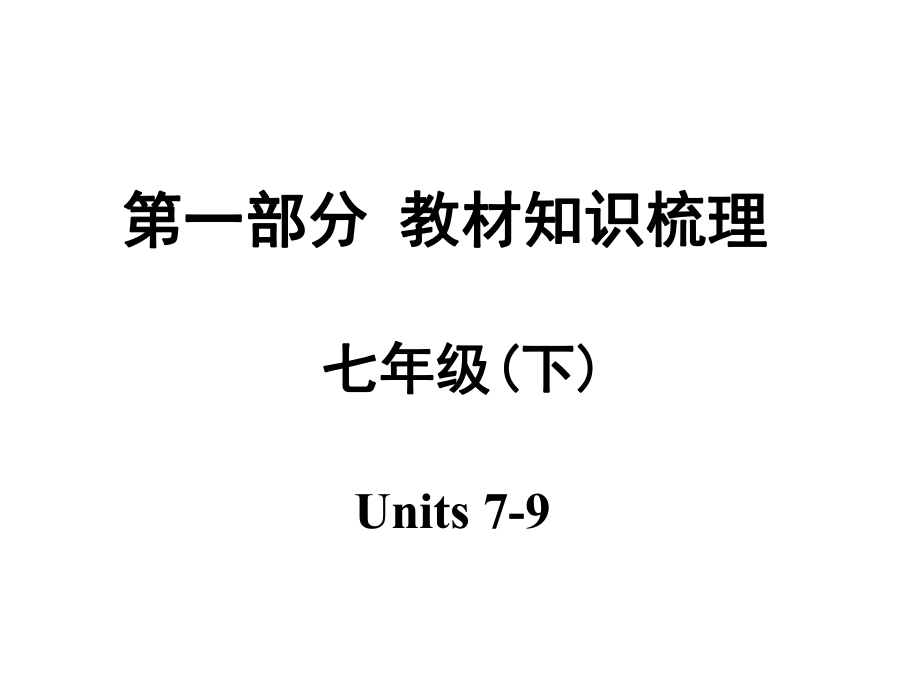《安徽中考英語(yǔ) 第一部分 教材知識(shí)梳理 七下 Units 79課件 人教新目標(biāo)版》由會(huì)員分享�����,可在線閱讀�����,更多相關(guān)《安徽中考英語(yǔ) 第一部分 教材知識(shí)梳理 七下 Units 79課件 人教新目標(biāo)版(18頁(yè)珍藏版)》請(qǐng)?jiān)谘b配圖網(wǎng)上搜索�����。
1�����、第一部分第一部分 教材知識(shí)梳理教材知識(shí)梳理七年級(jí)七年級(jí)( (下下) )Units 7-9考點(diǎn)一考點(diǎn)一 詢(xún)問(wèn)天氣的句型詢(xún)問(wèn)天氣的句型考點(diǎn)二考點(diǎn)二 辨析辨析message, information與與news考點(diǎn)三考點(diǎn)三 辨析辨析in front of與與in the front of考點(diǎn)四考點(diǎn)四 辨析辨析across, cross, over, through與與past考點(diǎn)五考點(diǎn)五 辨析辨析spend, pay, take與與cost考點(diǎn)六考點(diǎn)六 enjoy用法用法考點(diǎn)七考點(diǎn)七 What does sb. look like?句型句型考點(diǎn)八考點(diǎn)八 辨析辨析little, a little, f
2�����、ew與與a few 考點(diǎn)精講教材例句講考點(diǎn) 考點(diǎn)精講考點(diǎn)二考點(diǎn)二教材例句講考點(diǎn) Could I take a message for him? 我可以為他我可以為他捎個(gè)口信嗎捎個(gè)口信嗎�����? Yes. 可以?����?梢?����。(Unit 7 P38)message可數(shù)名詞�����,一般指可數(shù)名詞�����,一般指(書(shū)面或口頭的書(shū)面或口頭的)信息�����、信息�����、消息�����、音信�����。如:消息�����、音信�����。如:There were no messages for me.沒(méi)有消息給我沒(méi)有消息給我�����。辨析辨析 message, information與與news(2015年年36題)題)information不可數(shù)名詞�����,一般指信息�����、消息、情不可數(shù)名詞�����,一般指信
3�����、息�����、消息�����、情報(bào)�����、資料�����、資訊�����。如:報(bào)�����、資料�����、資訊�����。如:Please send me the information about your company.請(qǐng)把你公司的信請(qǐng)把你公司的信息發(fā)送給我�����。息發(fā)送給我�����。news不可數(shù)名詞�����,一般指新聞、消息�����。如:不可數(shù)名詞�����,一般指新聞�����、消息�����。如:Is there any good news today?今天有什么好消息嗎�����?今天有什么好消息嗎�����?拓展:拓展:take a message for sb.為某人捎口信�����;為某人捎口信�����;leave a message留口信�����;留口信�����;collect/receive information搜集搜集/接收信息�����。接收信息�����?����?键c(diǎn)三考
4、點(diǎn)三 辨析辨析in front of與與in the front of(2009年年34題題) The pay phone is in front of the library.投幣式投幣式公用電話在圖書(shū)館的前面�����。公用電話在圖書(shū)館的前面�����。(Unit 8 P44)in front of 表示位置表示位置“在在(外部外部)的前面的前面”at/in the front of表示位置表示位置“在在(內(nèi)部?jī)?nèi)部)的前面的前面”in front“在在(最最)前面前面”�����,后�����,后無(wú)賓語(yǔ)無(wú)賓語(yǔ)in front of the classat/in front of the classroomthe classThe
5�����、 teacher is giving lessons in front of the class.老老師在學(xué)生前面講課�����。師在學(xué)生前面講課�����。The teacher is giving lessons in the front of the classroom.老師在教室前面講課�����。老師在教室前面講課�����。The tallest boy of the class stands in front. 這個(gè)班最這個(gè)班最高個(gè)的男孩站在最前面�����。高個(gè)的男孩站在最前面�����?����?键c(diǎn)四考點(diǎn)四 辨析辨析across, cross, over, through與與past(2013年年37題題) Its across from t
6�����、he bank, behind the hotel.它在它在銀行的對(duì)面�����,旅館的后面�����。銀行的對(duì)面�����,旅館的后面�����。(Unit 8 P45)辨析詞辨析詞含義含義例句例句圖示辨析圖示辨析across介詞介詞“橫過(guò)�����,橫過(guò)�����,穿過(guò)穿過(guò)”�����,著重�����,著重指從一邊到另指從一邊到另一邊�����,指從表一邊�����,指從表面通過(guò)�����。面通過(guò)�����。Please help push the car across the bridge.請(qǐng)幫忙請(qǐng)幫忙把車(chē)推過(guò)橋�����。把車(chē)推過(guò)橋。go cross the bridge辨析詞辨析詞含義含義例句例句圖示辨析圖示辨析cross動(dòng)詞動(dòng)詞“穿過(guò)�����;穿過(guò)�����;橫過(guò)�����;越橫過(guò);越過(guò)過(guò)”,強(qiáng)調(diào)����,強(qiáng)調(diào)動(dòng)作�。動(dòng)作�����。Be careful
7、when you cross the road.過(guò)馬路時(shí)要小過(guò)馬路時(shí)要小心心�。over介詞介詞“橫過(guò),橫過(guò)���,越過(guò)越過(guò)”,指���,指從上方經(jīng)過(guò)��、從上方經(jīng)過(guò)���、跨越??缭健 wind is blowing over the sea.風(fēng)吹過(guò)風(fēng)吹過(guò)海面��。海面�。cross the roadjump over the fence辨析詞辨析詞含義含義例句例句圖示辨析圖示辨析through介詞介詞“穿過(guò),穿過(guò)�,通過(guò),經(jīng)通過(guò)���,經(jīng)過(guò)過(guò)”���,指從�����,指從空間通過(guò)�?�?臻g通過(guò)����。We can see through glass.我們能從玻璃我們能從玻璃看過(guò)去看過(guò)去。past介詞介詞“經(jīng)經(jīng)過(guò)過(guò)”���,指從�,指從旁邊經(jīng)過(guò)���。旁邊經(jīng)過(guò)�。I
8�、walked past him. 我從他我從他旁邊走過(guò)旁邊走過(guò)。go through the tunnelwalk past the desk 考點(diǎn)五考點(diǎn)五辨析辨析spend, pay, take與與cost(2010年年32題題) I like to spend time there on weekends.我喜歡在那兒度過(guò)周末我喜歡在那兒度過(guò)周末時(shí)光�����。(時(shí)光。(Unit 8 P47) 單詞單詞用法用法句型句型含義含義例句例句pay主語(yǔ)主語(yǔ)是人是人sb. pay(s) some money for sth.某人為某物某人為某物付款付款He has paid the doctor 50 pou
9����、nds for the medicine.他已向他已向醫(yī)生支付醫(yī)生支付50英鎊買(mǎi)英鎊買(mǎi)藥。藥�。take常用常用it作作形式形式主語(yǔ)主語(yǔ)It takes sb. some time to do sth.做某事花費(fèi)做某事花費(fèi)某人多長(zhǎng)時(shí)某人多長(zhǎng)時(shí)間間It took me ten minutes to go to the post office.到郵局花到郵局花費(fèi)了我十分鐘時(shí)間。費(fèi)了我十分鐘時(shí)間�。單詞單詞用法用法句型句型含義含義例句例句cost主語(yǔ)主語(yǔ)是物是物sth.cost(s)sb.some money某物花某物花費(fèi)某人費(fèi)某人多少錢(qián)多少錢(qián)It costs you 12 pounds to go t
10�����、o London by ship.乘乘船到倫敦要花費(fèi)船到倫敦要花費(fèi)12英鎊����。英鎊。spend主語(yǔ)主語(yǔ)是人是人sb. spend(s) . on sth.;sb. spend(s) . (in) doing sth.某人花某人花時(shí)間時(shí)間/金錢(qián)做金錢(qián)做某事某事He spends much money on books.他平時(shí)將很多錢(qián)用他平時(shí)將很多錢(qián)用在買(mǎi)書(shū)上����。在買(mǎi)書(shū)上?��?键c(diǎn)六考點(diǎn)六 enjoy的用法的用法(2008年年68題題) It is very quiet and I enjoy reading there.那那里非常安靜����,我喜歡在那里看書(shū)。里非常安靜�����,我喜歡在那里看書(shū)����。(Unit 8 P4
11、7)enjoy意為意為“享受�、喜歡、欣賞享受���、喜歡�、欣賞”�,為及物動(dòng)詞,為及物動(dòng)詞,相當(dāng)于相當(dāng)于likevery much或或be interested in����。如:。如:I enjoy eggs and milk for breakfast.早餐我喜歡吃雞早餐我喜歡吃雞蛋����、喝牛奶。蛋���、喝牛奶�����。enjoy doing sth.意為意為“喜歡做某事喜歡做某事”,后面接動(dòng)后面接動(dòng)名詞作賓語(yǔ)���。如:名詞作賓語(yǔ)�。如:Do you enjoy listening to music? 你喜歡聽(tīng)音樂(lè)嗎你喜歡聽(tīng)音樂(lè)嗎?enjoy oneself意為意為“玩得高興玩得高興”,后面接反身代詞后面接反身代詞作賓語(yǔ)作賓語(yǔ)
12��、,相當(dāng)于相當(dāng)于have a good time/have fun�����。如:����。如:We enjoyed ourselves/had fun at the party.我們?cè)谕頃?huì)我們?cè)谕頃?huì)上玩得很高興���。上玩得很高興���。考點(diǎn)八考點(diǎn)八 辨析辨析little, a little, few與與a few(2008年年31題題) Were meeting at seven, right?我們七點(diǎn)鐘見(jiàn)我們七點(diǎn)鐘見(jiàn)面�,對(duì)嗎��?面�,對(duì)嗎�����? Yeah, but I may be a little late.是的���,但我可是的�,但我可能會(huì)晚點(diǎn)兒���。能會(huì)晚點(diǎn)兒����。(Unit 9 P50) little, a little, few,
13�����、 a few都可以修飾名詞��,這四都可以修飾名詞�,這四個(gè)詞的區(qū)別如下:個(gè)詞的區(qū)別如下:a littlelittlea fewfew表肯定表肯定表否定表否定不可數(shù)名詞不可數(shù)名詞可數(shù)名詞可數(shù)名詞肯定意義肯定意義否定意義否定意義所跟名詞所跟名詞a little一點(diǎn)一點(diǎn)little幾乎沒(méi)有幾乎沒(méi)有不可數(shù)名詞不可數(shù)名詞a few一些,幾個(gè)一些����,幾個(gè)few幾乎沒(méi)有幾乎沒(méi)有可數(shù)名詞復(fù)數(shù)可數(shù)名詞復(fù)數(shù)There is a little wine left in the bottle. 瓶子里還剩瓶子里還剩一點(diǎn)兒酒����。一點(diǎn)兒酒�����。There is little wine left in the bottle. 瓶子里幾
14��、乎沒(méi)瓶子里幾乎沒(méi)酒了����。酒了����。He has few friends. 他幾乎沒(méi)有朋友�。他幾乎沒(méi)有朋友。There are a few differences between the two. 這兩這兩者之間有一些差異���。者之間有一些差異����。 考點(diǎn)沖關(guān)1. He left a _ saying he would probably be a little late.A. information B. messageC. news D. Suggestion2. There is a big tree _ my house. I always play games with my friends unde
15、r it.A. in front of B. in the front ofC. in front D. at the frontAB3. It _ Jim about an hour to finish his homework every day.A.spends B. costs C. pays D. takes4. I enjoyed _ computer games when I was a child. But now I know its not a good habit. A.playing B. play C. played D. to play5. There are _ books left. We cant lend you any one. A. few B. little C. a little D.a fewAAD
 安徽中考英語(yǔ) 第一部分 教材知識(shí)梳理 七下 Units 79課件 人教新目標(biāo)版
安徽中考英語(yǔ) 第一部分 教材知識(shí)梳理 七下 Units 79課件 人教新目標(biāo)版

